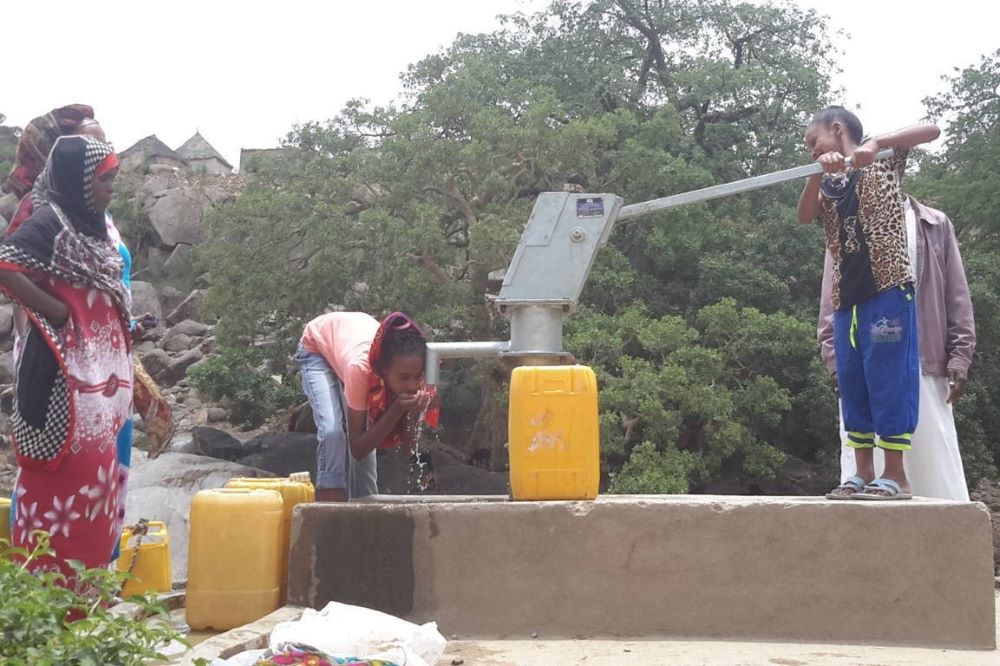
Community members in Dorze village, Chencha, Gamo Zone, Ethiopia, access water from a newly fixed community water point in November 2021. This is a densely populated area in the Rift Mountains and this community water point serves approximately 546 people, according to Vita. (Courtesy of Vita)
Catholic impact investors in the United States and Ireland, including a number of religious congregations, are financing safe water and carbon-saving cookstoves for 1.3 million people in Ethiopia, which will save up to 630,000 tons in carbon emissions annually. The $10 million Green Impact Fund is a collaboration between these Catholic investors and Irish development agency Vita, whose Laudato Si'-aligned projects in Ethiopia will also see millions of trees planted in the East African country.
The investment in Vita's projects, which also emphasize climate justice and gender equality, has been facilitated by the Catholic Impact Investing Collaborative, or CIIC, as well as other investors that include Partners for the Common Good, an offshoot of Christian Brothers Investment Services, the Osprey Foundation and some Irish venture philanthropists.
According to John Weakliam, CEO of Vita, the fund is a response to Pope Francis' plea to hear "the cry of the earth and the cry of the poor." The investment model for the new Green Impact Fund was piloted successfully between 2016 and 2020 when Vita raised $2 million to deliver clean water and carbon-saving cookstoves to 311,000 people in Ethiopia. This generated 2 million tons of carbon emissions' savings and saw up to 5 million trees saved or planted, Vita said. The resulting carbon offsets were purchased by Irish and international organizations looking to complement emissions reductions with premier carbon offsets.
Weakliam explained that clean water does not have to be boiled, thus saving trees from being cut down and burned to heat the water. Additionally, the fuel-efficient cookstoves they offer use 60 percent less wood.
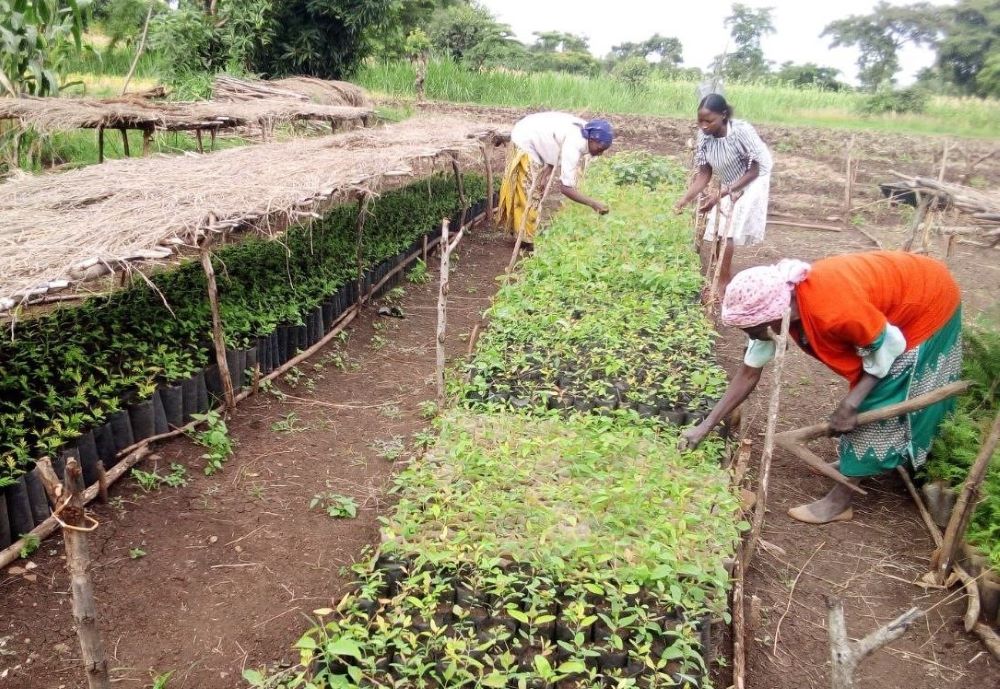
Community members plant saplings in a tree nursery just outside Arba Minch, in Gamo, Ethiopia. Conservation training and forestry restoration is an important part of the wood stove program. Each stove recipient has to plant at least 20 trees to replenish the local forestry and help with soil retention. (Courtesy of Vita)
"Reduced wood burning means reduced carbon emissions and each ton of carbon emission savings converts to one ton of carbon credit. These credits are sold on voluntary carbon markets," he said. "The new fund will provide investors with reasonable returns from the sale of verified and accredited carbon credits (offsets) generated by the fuel-efficient stoves and community water points."
The religious congregations and organizations working via the CIIC include the USA-based Franciscan Sisters of Perpetual Adoration, Mercy Investment Services, the Franciscan Sisters of Mary, and the Sisters of St. Joseph of Peace alongside Irish congregations St. Patrick's Missionary Society and the Mercy Sisters Western Province.
Sr. Sue Ernster is president of the Franciscan Sisters of Perpetual Adoration and president-elect of the Leadership Conference of Women Religious, or LCWR, which represents two-thirds of Catholic Sisters in the United States. An accountant by training, she previously worked as her congregation's CFO from 2013 to 2022. "In 2018, our congregation made a decision to amplify our impact investing opportunities," she said, As part of that decision, members of the congregation attended a virtual, 4-week workshop on how faith-based asset holders can invest in line with Catholic social teaching, offered by the Francesco Collaborative, a project inspired by Pope Francis' Economy of Francesco movement.
A significant factor in the Franciscan Sisters of Perpetual Adoration's decision to invest in Vita was the aging profile of its membership and declining numbers. "When I entered 25 years ago, we were over 600 and just now we are 142. Our median age is 82. We have maybe 20 people under the age of 65," Ernster explained. "We don't have the numbers to be able to do the types of ministry that we were involved in before. So how do we continue our impact with the assets that we have?"
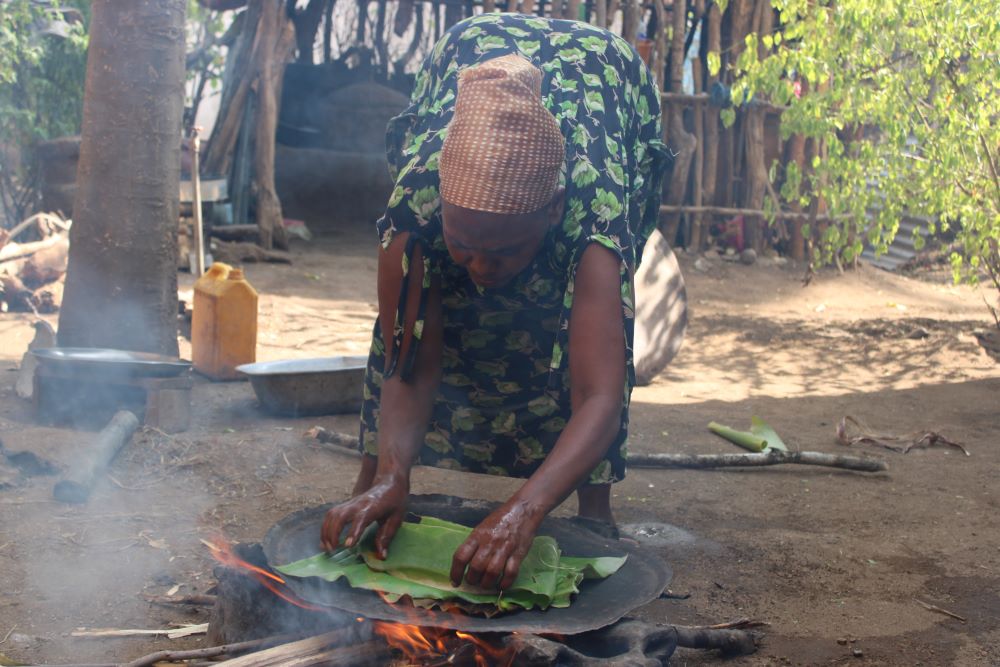
Falekech Girma in early March 2023, cooking on an open fire before she adopted an improved fuel-efficient cookstove, in Lante village, Gamo Zone, South Ethiopia. (Courtesy of Vita)
In 2021, the congregation decided to divest from fossil fuels. "We made the decision and we worked with our investment advisers to find other options that could give us a similar return but would not be extractive.," Ernster said. "It was a huge shift. There was resistance from our investment advisers because we were pulling the funds out of our publicly traded portfolio. We had to consider if it was only about the financial return or did the impact of the investment outweigh the fact that we might not get a market rate return."
Ernster told Earthbeat that through impact investing "congregations can work together for mission in alignment" with Pope Francis' vision in Laudato Si' and Let Us Dream. "He is calling all of us to disrupt the economy so that our current system, which marginalizes people and is broken, is changed so that all can have greater access," she said. "As our congregational numbers shift because of our demographic, it is another way we can continue mission and can continue to have our values impact others."
Vita was the congregation's first project outside the United States. They have since invested in a coffee and honey cooperative in Chiapas, Mexico.
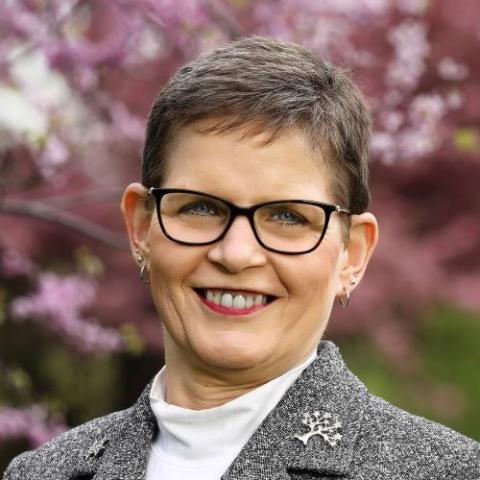
Sr. Sue Ernster, an accountant by training, is president of the Franciscan Sisters of Perpetual Adoration. (Courtesy of Sue Ernster)
"We chose to go global because we realized we are so interconnected, that we need to have an effect globally, not only in the United States, so that people do not need to migrate and leave their home countries," Ernster said. "We also have a history of wanting to empower women. Vita is helping the women in Ethiopia to save several hours in their day by not having to travel to get the water."
"There is a lot of education to be done on impact investing," Ernster said, paying tribute to the CIIC, a network through which congregations can share information. "When we started on this journey of amplifying our investing, we didn't really know the questions to ask and so to hear from people who are so willing to share their experience and understanding of impact investing and how to find those opportunities, has been such a gift."
Sr. Margaret Tiernan is a member of Vita's board. She belongs to the Western Province of the Sisters of Mercy in Ireland, a longtime Vita partner. The Mercy Sisters' motivation for partnership with Vita mirrors that of the Franciscan Sisters of Perpetual Adoration. "Vita gave Mercy a new way of mission due to our present age profile," Tiernan said.
Tiernan noted similarities between the congregation's and the development agency's core values, such as their mutual concern for the integrity of God's creation and "a determination to work towards mitigating the impacts of climate change on those who are least responsible for climate change."
The Western Province of the Mercy Sisters in Ireland contributed $63,562 (60,000 euros) a year to Vita's work between 2009 and 2018. But they had to review that contribution in 2018 due to the escalating costs of caring for their aging membership. However, the provincial leadership gave an additional $77,334 (73,000 euros) toward Vita's Green Impact Fund and the sisters in the province have continued to contribute small amounts from their pocket money on a monthly basis.
Tiernan believes Vita's Green Impact Fund is particularly "visionary" because of its circular model and its focus on communities. Vita, she said, believes that the traditional models of development underdeliver in terms of impact, and that new models of blended finance rather than grants better meet the current challenges of poverty and climate change in Africa. Impact investments are designed to deliver returns back to the participating communities and to investors.
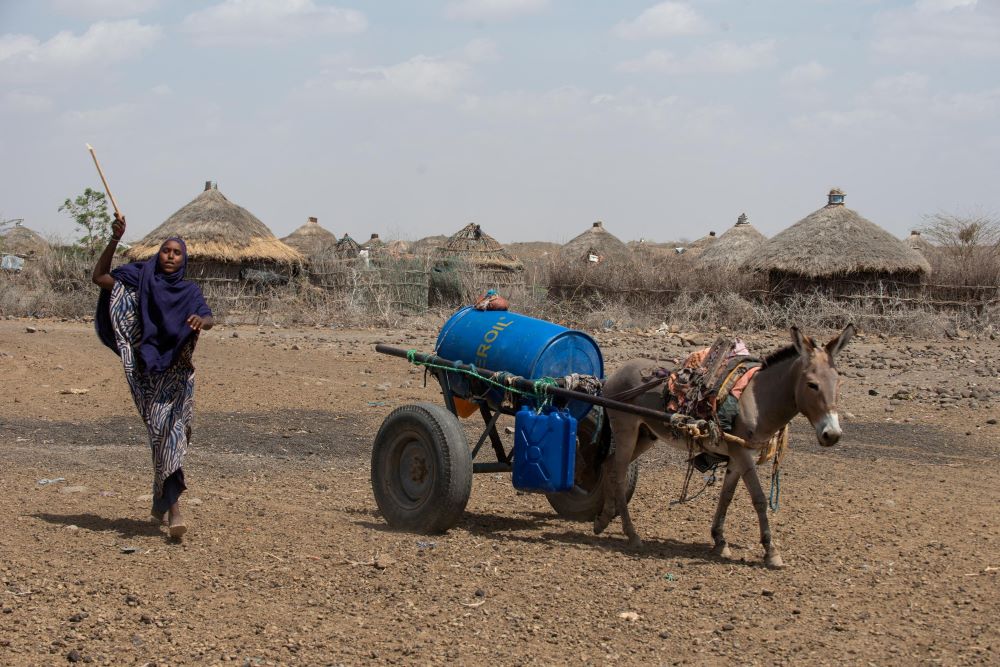
A woman walks near her donkey cart transporting a barrel of water in the drought-stricken area of Higlo Kebele, Ethiopia, Feb. 8, 2022. (CNS/Reuters/World Food Program/Michael Tewelde)
The needs in Ethiopia are huge. It is one of the poorest countries in the world, with more than 70% of the population living on less than $2 a day. A harsh climate in which rainfall is erratic and drought is prevalent often prevents farmers growing enough to earn an income or even feed their families. In a bid to stem some migration from rural areas, Vita has established small livelihood projects, some of which are targeted specifically at women. In the village of Dorze, high in the Rift Mountains of the Gamo Zone of southern Ethiopia, Vita established a weaving cooperative, allowing men to work at home rather than having to move to Addis Ababa. The women involved in a pottery cooperative are able to sell their work at the local market, generating an income to support their family and educate their children.
According to Vita's Weakliam, "improved cookstoves are a staple development tool all over Africa." Traditional open fires are, he stressed, very destructive to health and the pollution caused by open flames is responsible for more deaths than AIDS, cholera and dirty water put together.
"They are very inefficient and use a lot of wood. Seventy percent of the heat energy never reaches the end of the pot," he said. "The women and girls have to collect the wood for these fires, which keeps the girls out of school and the women from other work that could generate an income."
Advertisement
Tending open fires also lead to chronic back problems, he said. "It also has a devastating effect on local forestry which in turn causes soil to run off into local water sources," he added. "It's bad all round."
Improved cookstoves reduce the amount of wood needed. But the rates of adaptation to them in Africa are low, often just 40 or 50 percent. This is due to a lack of consultation by many NGOs. Consequently there is no sense of ownership or understanding of the stoves. Vita approaches it differently: Consultation is at the core.
"The women decide whether they want the new stoves or not," Weakliam explained. The consultation "involves explaining about the importance to their futures of preserving the environment, the impact on health, the reduction of burn injuries. The kids learn separately and make posters and artworks about conservation. The men are also included — nobody is excluded from these activities."
If the community decides to convert to the news stoves, "they set up a co-op and Vita trains them and supplies the molds so that they can make and sell the stoves to themselves and other villages," Weakliam said. "The communities make all the decisions, do all the adapting themselves and then deliver it themselves."







